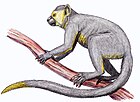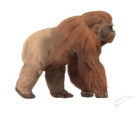Rangwapithecus
Зовнішній вигляд
| Rangwapithecus | |
|---|---|

| |
| Щелепа Rangwapithecus gordoni | |
| Біологічна класифікація | |
| Царство: | Тварини (Animalia) |
| Тип: | Хордові (Chordata) |
| Клада: | Синапсиди (Synapsida) |
| Клас: | Ссавці (Mammalia) |
| Ряд: | Примати (Primates) |
| Підряд: | Haplorhini |
| Інфраряд: | Вищі примати (Simiiformes) |
| Родина: | †Dendropithecidae |
| Підродина: | †Nyanzapithecinae |
| Рід: | †Rangwapithecus Andrews, 1974 |
Rangwapithecus — вимерлий рід мавп раннього міоцену Кенії. Пізньоміоценові фаланги з Угорщини також були віднесені до цього роду, але пізніше були перекласифіковані як дріопітеки[1].
Рангвапітек важив приблизно 15 кг, а розмір і форма зубів мавпи вказують на те, що це був листоїд[2]. Ця деревна мавпа з найдавнішого міоцену[3] пристосована до життя в тропічному лісі, пов'язана зокрема з островом Мфангано[4], хоча раніше цей вид населяв лісисто-чагарникову місцевість[5].
Rangwapithecus симпатричний з Proconsul[6], і може бути синонімом як Proconsul gordoni так і Proconsul vancouveringi[7].
- ↑ Begun, 1988
- ↑ Fleagle, 1999, с. 462
- ↑ Lyell, 1833, с. 343
- ↑ Andrews та Kelley, 2007, Abstract
- ↑ Andrews та Evans, 1979
- ↑ Cameron, 2004, с. 62
- ↑ Tuttle, 1986, с. 28
- Andrews, Peter (May 2000). Evolution and Environment in the Hominoidea. У Gee, H (ред.). Shaking the tree: readings from Nature in the history of life. University of Chicago Press. ISBN 978-0-226-28497-2.
- Andrews, P; Cronin, JE (1982). The relationships of Sivapithecus and Ramapithecus and the evolution of the orang-utan. Nature. 297 (5867): 541—6. Bibcode:1982Natur.297..541A. doi:10.1038/297541a0. PMID 7045678. S2CID 4368755.
- Andrews, P.; Evans, E. N. (1979). The Environment of Ramapithecus in Africa. Paleobiology. 5 (1): 22—30. doi:10.1017/s0094837300006266. JSTOR 2400387.
- Andrews, Peter; Kelley, Jay (2007). Middle Miocene Dispersals of Apes. Folia Primatologica. 78 (5–6): 328—43. doi:10.1159/000105148. PMID 17855786. S2CID 19293586.
- Begun, David R. (1988). Catarrhine phalanges from the Late Miocene (Vallesian) of Rudabánya, Hungary (PDF). Journal of Human Evolution. 17 (4): 413—37. doi:10.1016/0047-2484(88)90030-9. Процитовано 22 грудня 2012.
- Cameron, D. W. (2004). Hominid adaptations and extinctions. UNSW Press. ISBN 9780868407166.
- Fleagle, JG (1999). Primate adaptation and evolution. Academic Press. ISBN 978-0-12-260341-9.
- Greenfield, Leonard Owen (1979). On the adaptive pattern of "Ramapithecus". American Journal of Physical Anthropology. 50 (4): 527—48. doi:10.1002/ajpa.1330500406. PMID 111557.
- Greenfield, L. O. (1987). A Late Divergence Hypothesis. У Ciochon, Russell L.; Fleagle, John G. (ред.). Primate evolution and human origins. Evolutionary Foundations of Human Behavior Series. Transaction Publishers. с. 222. ISBN 9780202011752. Процитовано 29 грудня 2011.
- Leakey, R.E.; Leakey, M.G. (1987). A new Miocene small-bodied ape from Kenya. Journal of Human Evolution. 16 (4): 369—87. doi:10.1016/0047-2484(87)90067-4.
- Lyell, C (1833). Principles of geology: being an attempt to explain the former changes of the earth's surface by reference to causes now in operation, Volume 3. J. Murray. Процитовано 29 грудня 2011.
- Schwartz, JH (1984). The evolutionary relationships of man and orang-utans. Nature. 308 (5959): 501—5. Bibcode:1984Natur.308..501S. doi:10.1038/308501a0. PMID 6424028. S2CID 4343195.
- Tuttle, R. (1986). Apes of the world: their social behavior, communication, mentality, and ecology. Noyes Publ. с. 28. ISBN 9780815511045.
- Tuttle, Russell H. (2006). Seven Decades of East African Miocene Anthropoid Studies. У Ishida, Hidemi; Tuttle, Russell; Pickford, Martin; Ogihara, Naomichi; Nakatsukasa, Masato (ред.). Human origins and environmental backgrounds. Developments in Primatology: Progress and Prospects. Birkhäuser. с. 15–29. ISBN 978-0387296388.
- Wolpoff, M. H.; De Bonis, L.; Fleagle, J. G.; Frayer, D. W.; Greenfield, L. O.; Jacobs, K. H.; Protsch, R.; Rightmire, P. G.; Sarich, V. (1982). Ramapithecus and Hominid Origins [and Comments and Reply]. Current Anthropology. 23 (5): 501—522. doi:10.1086/202893. JSTOR 2742391. S2CID 88285271.




